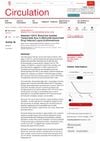1 citations,
April 2018 in “Медицинский совет” Minoxidil effectively treats early-stage androgenic alopecia with visible results in 4-6 months and minimal side effects.
 1 citations,
August 2017 in “Asian Journal of Pharmaceutical and Clinical Research”
1 citations,
August 2017 in “Asian Journal of Pharmaceutical and Clinical Research” The 1% ethyl acetate fraction ethosomal gel from Nothopanax scutellarium leaves promotes hair growth but can mildly irritate the skin.
 November 2024 in “Journal of Drugs in Dermatology”
November 2024 in “Journal of Drugs in Dermatology” Injectable minoxidil is a promising, effective treatment for hair loss.
September 2024 in “Dermatology Online Journal” Facial hair growth from minoxidil stopped after she quit using it.
 February 2024 in “Cosmoderma”
February 2024 in “Cosmoderma” Low-dose oral minoxidil can help treat male and female pattern hair loss, especially in those who can't use topical treatments or have heart health issues.
 June 2023 in “Drugs & Therapy Perspectives”
June 2023 in “Drugs & Therapy Perspectives” New treatments for male pattern hair loss look promising, but established treatments are still the main option.
September 2022 in “Health and Medical Journal” Minoxidil and oral antioxidants helped improve hair growth in a patient with hair loss due to lupus.
 August 2020 in “Revista de chimie”
August 2020 in “Revista de chimie” Nitroglycerin ointment is now used to treat several skin conditions with fewer side effects.
July 2019 in “Dermatology practical & conceptual” The study found that alopecia areata is strongly linked to autoimmune diseases and may indicate a genetic predisposition to such conditions.
April 2011 in “The FASEB Journal” Topical Minoxidil is cost-effective for managing baldness but requires continuous use.
 November 1991 in “PubMed”
November 1991 in “PubMed” Minoxidil, a topical solution, was found to slow balding in most cases and increase hair density in some, but only a few saw significant cosmetic improvement.
January 2023 in “Revista Ibero-Americana de Humanidades, Ciências e Educação” Combining Finasteride and Minoxidil effectively treats hair loss in middle-aged men.
 January 2022 in “Przegla̧d dermatologiczny”
January 2022 in “Przegla̧d dermatologiczny” Minoxidil, a medicine initially for high blood pressure, can stimulate hair growth and is promising for treating hair loss, but it may cause side effects like itching and dizziness.
 39 citations,
November 1984 in “Journal of Cardiovascular Pharmacology”
39 citations,
November 1984 in “Journal of Cardiovascular Pharmacology” Minoxidil lowers blood pressure, increases heart rate, and improves blood flow in dogs.
 November 2019 in “Actas Dermo-Sifiliográficas”
November 2019 in “Actas Dermo-Sifiliográficas” Oral minoxidil helps treat hair loss and has reversible side effects.
 1 citations,
June 2021 in “General physiology and biophysics”
1 citations,
June 2021 in “General physiology and biophysics” Minoxidil relaxes rat blood vessels mainly through nitric oxide and potassium channels.
 November 2023 in “Circulation”
November 2023 in “Circulation” Minoxidil can cause a rare but serious condition that leads to fluid buildup around the heart and drug-induced lupus.
 26 citations,
June 1983 in “Journal of Hypertension”
26 citations,
June 1983 in “Journal of Hypertension” Minoxidil lowers blood pressure more effectively but has more side effects, so try hydralazine first.
 December 2023 in “Farmateka”
December 2023 in “Farmateka” Minoxidil is an effective and safe treatment for common hair loss when applied to the skin, but more research is needed for optimal use.
 17 citations,
April 1975 in “The Journal of Pediatrics”
17 citations,
April 1975 in “The Journal of Pediatrics” Minoxidil effectively controls severe high blood pressure in children with few side effects.
23 citations,
July 1993 in “The journal of investigative dermatology/Journal of investigative dermatology” Certain chemicals and peptides can promote hair growth or prevent baldness.
 22 citations,
January 1979 in “JAMA”
22 citations,
January 1979 in “JAMA” Minoxidil can lower blood pressure effectively and safely in emergencies.

Minoxidil helps stimulate hair growth and enlarge small follicles in common hair loss, but doesn't stop it, and its effects can be boosted when combined with finasteride.
 January 2018 in “Elsevier eBooks”
January 2018 in “Elsevier eBooks” Minoxidil helps lower severe blood pressure and promotes hair growth but can have serious side effects and must be used continuously.
 109 citations,
July 1984 in “Circulation”
109 citations,
July 1984 in “Circulation” Minoxidil helps heart function but doesn't improve exercise ability and may cause complications.
 57 citations,
January 1980 in “Journal of Cardiovascular Pharmacology”
57 citations,
January 1980 in “Journal of Cardiovascular Pharmacology” Minoxidil treats high blood pressure and side effects can be managed.
 50 citations,
September 1975 in “American Heart Journal”
50 citations,
September 1975 in “American Heart Journal” Minoxidil effectively controls blood pressure in severe cases, but may cause fluid retention and edema.
 48 citations,
June 1988 in “PubMed”
48 citations,
June 1988 in “PubMed” Minoxidil sulfate relaxes muscle by increasing potassium flow, making it a unique muscle relaxer.
 43 citations,
May 1978 in “JAMA”
43 citations,
May 1978 in “JAMA” Minoxidil controls blood pressure but may cause kidney damage and needs diuretics to prevent swelling.
 25 citations,
December 2001 in “Expert Opinion on Pharmacotherapy”
25 citations,
December 2001 in “Expert Opinion on Pharmacotherapy” Potassium channel openers show promise for treating heart disease and other conditions, but more research is needed to fully understand their effects and safety.






















